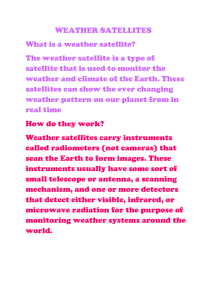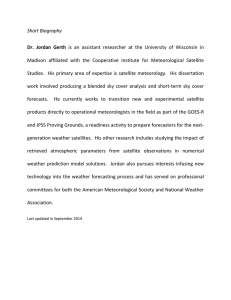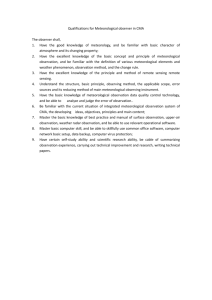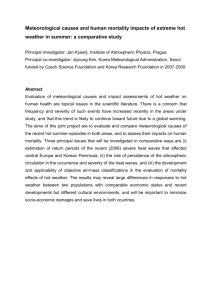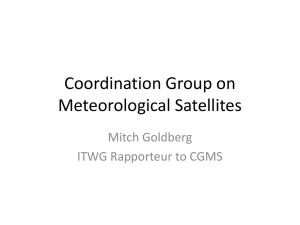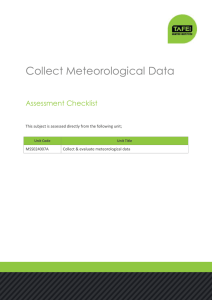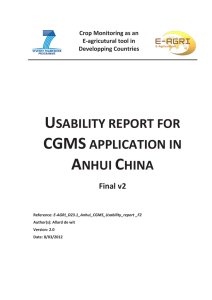Coordination Group for Meteorological Satellites - CGMS
advertisement
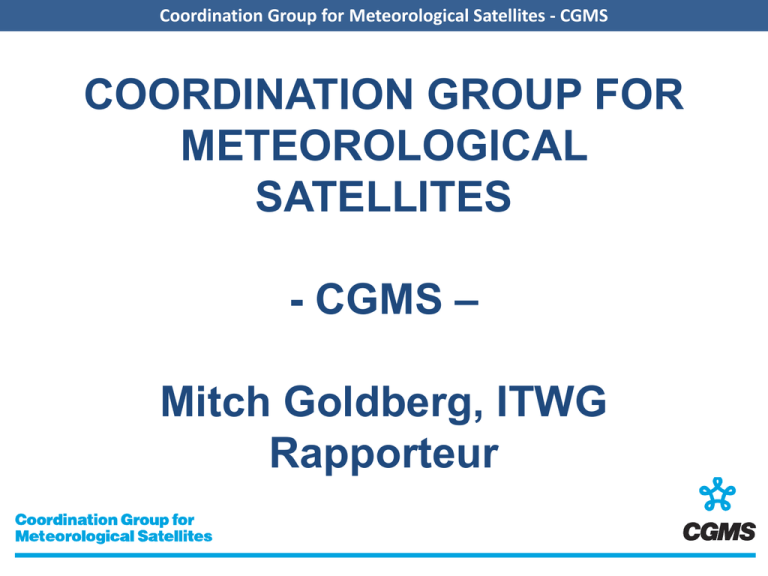
Coordination Group for Meteorological Satellites - CGMS COORDINATION GROUP FOR METEOROLOGICAL SATELLITES - CGMS – Mitch Goldberg, ITWG Rapporteur Coordination Group for Meteorological Satellites - CGMS CGMS: The Coordination on Geostationary Meteorological Satellites was initially created in 1972 to consider common interests relating to the design, operation and use of planned meteorological satellites. The name was later changed to the Coordination Group for Meteorological Satellites to include low-Earth orbit satellites and the activities are governed by a Charter. The CGMS meets in plenary session on an annual basis following meetings of four Working Groups on telecommunication, satellite data and products, operational continuity and contingency planning, and global data dissemination respectively. Members: Members are those organisations and space agencies that are current and prospective developers and operators of meteorological satellites ; Space agencies operating R&D satellites contributing to WMO programmes; WMO, because of its unique role as representative of the world meteorological data user community. Current members: CMA, CNES, CNSA, ESA, EUMETSAT (CGMS Secretariat since 1987), IMD, IOC/UNESCO, ISROJAXA, JMA, KMA, NASA, NOAA, ROSCOSMOS, ROSHYDROMET, and WMO Coordination Group for Meteorological Satellites - CGMS The objectives of CGMS are formalised within its Charter: To provide an international forum for the exchange of technical information on geostationary and polar-orbiting meteorological satellite systems and research & development missions, such as reporting on current meteorological satellite status and future plans, telecommunications matters, operations, intercalibration of sensors, processing algorithms, products and their validation, data transmission formats and future data transmission standards. To harmonise meteorological satellite mission parameters (such as orbits, sensors, data formats and downlink frequencies) to the greatest extent possible. To encourage complementarity, compatibility and possible mutual back-up in the event of system failure through cooperative mission planning, compatible meteorological data products and services and the coordination of space and data-related activities, thus complementing the work of other international satellite coordinating mechanisms. Slide: 3 Coordination Group for Meteorological Satellites - CGMS Coordination Group for Meteorological Satellites - CGMS Examples of CGMS achievements: • Establishment of a global back-up framework (contingency planning) - the concept of “helping thy neighbour” e.g. manoeuvring an available satellite to a different location to support satellite observations. In the 1980s NOAA’s GOES-4 satellite successfully supported the Meteosat DCS that had run into difficulties. Later in the early 1990s, Meteosat-3 was moved to a position over the Western Atlantic to support NOAA to perform an operational imaging mission vital for hurricane observations. This established partnership continued in 2003 when NOAA supported JMA with GOES-9 to perform operational imaging after retiring GMS-5 and before the availability of MTSAT-1; • Development of an integrated strategy for data dissemination and data exchange (GTS, Internet, ADM, GEONETCast...); • Coordinated activities toward protection of radio frequencies; • Development of a coordinated approach to calibration and intercalibration (Global Space-based Inter-calibration System – GSICS); • Promotion and development of a coordinated framework for generating climate data records from space observations (SCOPE-CM); • Standardisation of data dissemination formats and coordinated planning for the analogue to digital transition; • Overarching framework for science development and the improvement and utilisation of satellite products through International Science Working Groups that interact with CGMS (the International TOVS Working Group - addressing satellite radiance measurements and retrievals in a broad sense; the International Winds Working Group addressing Atmospheric Motion Vectors (AMVs) and winds from satellites in general; the International Precipitation Working Group and the International Radio-occultation Working Group); • Development of a common standard for the International Data Collection System (IDCS); • Promotion of a common approach to archiving of data and products; and • Early morning orbit discussion led to CMA decision to fly in early AM. • Promotion of training and the development of the Virtual Training Laboratory (VLab). • The close cooperation of CGMS leads to an optimisation and coordinated enhancement of the WMO Global Observing System (GOS). CGMS operators inter alia adopted the WMO vision for the GOS to 2025; Slide: 5 Coordination Group for Meteorological Satellites - CGMS More recent coordinating management tool - High Level Priority Plan (HLPP) CGMS reviews the HLPP on an annual basis, considering in particular new requirements and perspectives arising from interactions with the user and scientific communities, the development of applications, e.g. NWP, and relevant research activities. It ensures proper interaction with other space agencies and their relevant constituencies (e.g. CEOS including its working groups and virtual constellations). Enhancing CGMS as a forum offering the scope for detailed technical discussions required to coordinate meteorological satellite observing systems and maximise the overall benefits for the user community Enhancing the collaboration between CGMS and the international science working groups (ITWG, IPWG, IWWG, IROWG) Slide: 6 Coordination Group for Meteorological Satellites - CGMS Further information on CGMS: Web: www.cgms-info.org E-mail: cgmssec@eumetsat.int CGMS-40: The next and 40th plenary meeting, CGMS-40, will be held in Lugano, Switzerland on 7-8 November 2012 (preceded by the four Working Groups on 5-6 November). The meeting is hosted by WMO, the Federal Department of Foreign Affairs (FDFA) of Switzerland and the Federal Office of Meteorology and Climatology, MeteoSwiss. EUM/SIR/VWG/12/0???, v1, 10 July 2012 Slide: 7 Coordination Group for Meteorological Satellites - CGMS
